South Western operators face
Page 31
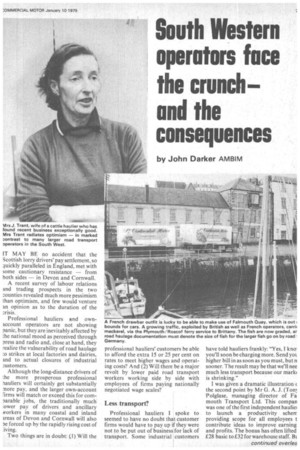
Page 32
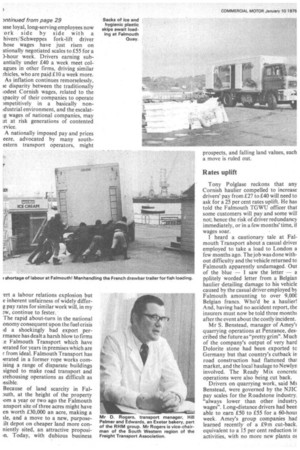
Page 33
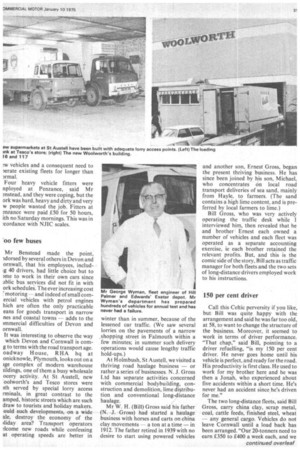
Page 34
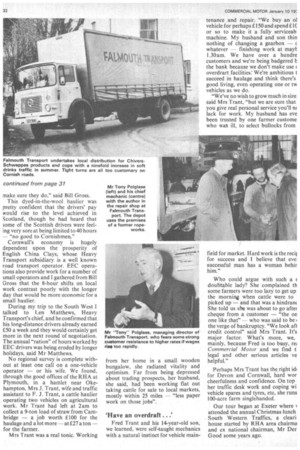
Page 35
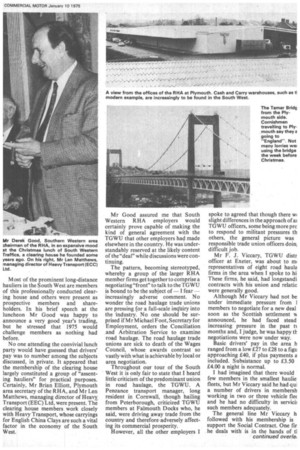
Page 36
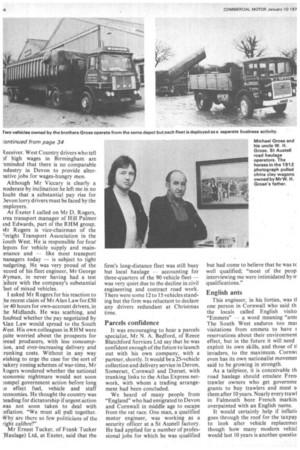
If you've noticed an error in this article please click here to report it so we can fix it.
the crunch—
and the consequences
by John Darker AMBIM IT MAY BE no accident that the icottish lorry drivers' pay settlement, so quickly paralleled in England, met with some cautionary resistance — from both sides — in Devon and Cornwall.
A recent survey of labour relations and trading prospects in the two :ounties revealed much more pessimism than optimism, and few would venture ln opinion as to the duration of the Professional hauliers and ownaccount operators are not showing panic, but they are inevitably affected by the national mood as perceived through 3ress and radio and, close at hand, they realize the vulnerability of road haulage :o strikes at local factories and dairies, Ind to actual closures of industrial :ustomers.
Although the long-distance drivers of :he more prosperous professional lauliers will certainly get substantially more pay, and the larger own-account l'irms will match or exceed this for comparable jobs, the traditionally much .ower pay of drivers and ancillary workers in many coastal and inland Ireas of Devon and Cornwall will also De forced up by the rapidly rising cost of iving.
Two things are in doubt: (1) Will the professional hauliers' customers be able to afford the extra 15 or 25 per cent on rates to meet higher wages and operating costs? And (2) Will there be a major revolt by lower paid road transport workers working side by side with employees of firms paying nationally negotiated wage scales?
Less transport?
Professional hauliers 1 spoke to seemed to have no doubt that customer firms would have to pay up if they were not to be put out of business for lack of transport. Some industrial customers have told hauliers frankly: "Yes, I kno. you'll soon be charging more. Send yot higher bill in as soon as you must, but n sooner. The result may be that we'll nee much less transport because our markt is shrinking."
I was given a dramatic illustration the second point by Mr G. A. J. (Toni • Polglase, managing director of Fa mouth Transport Ltd. This compan was one of the first independent hauliei to launch a productivity scherr providing scope for all employees t contribute ideas to improve earning and profits. The bonus has often lifted £28 basic to £32 for warehouse staff. Bt tese loyal, long-serving employees now ork side by side with a hiversi Schweppes fork-lift driver hose wages have just risen on ationally negotiated scales to £55 for a )-hour week. Drivers earning subantially under £40 a week meet colagues in other firms, driving similar !hides, who are paid £10 a week more. As inflation continues remorselessly, le disparity between the traditionally lodest Cornish wages, related to the tpacity of their companies to operate )mpetitively in a basically nonIdustrial environment, and the escalats wages of national companies, may at at risk generations of contented :rvice.
A nationally imposed pay and prices eeze, advocated by many southestern transport operators, might • ert a labour relations explosion but e inherent unfairness of widely differg pay rates for similar work will, in my continue to fester.
The rapid about-turn in the national onomy consequent upon the fuel crisis Ld a shockingly bad export perrmance has dealt a harsh blow to firms .e Falmouth Transport which have erated for years in premises which are r from ideal, Falmouth Transport has lerated in a former rope works comising a range of disparate buildings signed to make road transport and trehousingoperations as difficult as Because of land scarcity in Fal)uth, at the height of the property ,om a year or two ago the Falmouth ansport site of three acres might have en worth £30,000 an acre, making a ale, and a move to a new, purposeiit depot on cheaper land more conniently sited, an attractive proposiin. Today, with dubious business prospects, and falling land values, such a move is ruled out.
Rates uplift
Tony Polglase reckons that any Cornish haulier compelled to increase drivers' pay from £27 to £40 will need to ask for a 25 per cent rates uplift. He has told the Falmouth TGWU officer that some customers will pay and some will not; hence the risk of driver redundancy immediately, or in a few months' time, il wages soar.
I heard a cautionary tale at Falmouth Transport about a casual driver employed to take a load to London a few months ago. The job was done without difficulty and the vehicle returned to Falmouth apparently undamaged. Out of the blue — I saw the letter — a politely worded letter from a Belgian haulier detailing damage to his vehicle caused by the casual driver employed by Falmouth amounting to over 9,00C Belgian francs, Who'd be a haulier! And, having had no accident report,,the insurers must now be told three months after the event about the costly incident.
Mr S. Benstead, manager of Amey's quarrying operations at Penzance, described the future as "pretty grim". Much of the company's output of very hard Dolorite stone had been exported tc Germany but that country's cutback in road construction had flattened thai market, and the local haulage to Newlyn involved, The Ready Mix concrete operations were also being cut back.
Drivers on quarrying work, said Mt Benstead, were governed by the NJIC pay scales for the Roadstone industry. "always lower than other industry wages". Long-distance drivers had been able to earn £50 to £55 for a 60-houi week. Amey's group companies had learned recently of a £9m cut-back, equivalent to a 15 per cent reduction in activities, with no more new plants cot !IN vehicles and a consequent need to )erate existing fleets for longer than )rmal.
Four heavy vehicle fitters were nployed at Penzance, said Mr nstead, and they were coping, but the ork was hard, heavy and dirty and very w people wanted the job. Fitters at .nzance were paid £50 for 50 hours, ith no Saturday mornings. This was in :cordance with NJIC scales.
on few buses
Mr Benstead made the point, ldorsed by several others in Devon and ornwall, that his employees, includg 40 drivers, had little choice but to )me to work in their own cars since Jblic bus services did not fit in with ork schedules. The ever increasing cost motoring — and indeed of small cornercial vehicles with petrol engines hich are often the only practicable eans for goods transport in narrow nes and coastal towns — adds to the nilmercial difficulties of Devon and ornwall.
It was interesting to observe the way which Devon and Cornwall is corng to terms with the road transport age. oadway House, RHA hq at onicknowle, Plymouth, looks out on a ige complex of modern warehouse hidings, one of them a busy wholesale ocery activity. At St Austell, new oolworth's and Tesco stores were Ah served by special lorry access rrninals, in great contrast to the amped, historic streets which are such draw to tourists and holiday makers. ould such developments, on a wide ale, destroy the economy of the Iliday area? Transport operators Acome new roads while confessing at operating speeds are better in winter than in summer, because of the lessened car traffic. (We saw several lorries on the pavements of a narrow .shopping street in Falmouth within a few minutes; in summer such delivery operations would cause lengthy traffic hold-ups.) At Hoimbush, St Austell, we visited a thriving road haulage business — or rather a series of businesses. N. J. Gross Ltd has separate activities concerned with commercial bodybuilding, construction and demolition, lime distribution and conventional long-distance haulage.
Mr W. H. (Bill) Gross said his father (N. J. Gross) had started a haulage business with horses and carts on china clay movements -a ton at a time — in 1912. The father retired in 1939 with no desire to start using powered vehicles and another son, Ernest Gross, began the present thriving business. He has since been joined by his son, Michael, who concentrates on local road transport deliveries of sea sand, mainly from Hayie, to farmers. (The sand contains a high lime content, and is preferred by local farmers to lime.) Bill Gross, who was very actively operating the traffic desk while I interviewed him, then revealed that he and brother Ernest each owned a number of vehicles and each fleet was operated as a separate accounting exercise, ie each brother retained the relevant profits. But, and this is the comic side of the story, Bill acts as traffic manager for both fleets and the two sets of long-distance drivers employed work to his instructions.
150 per cent driver
Call this Celtic perversity if you like, but Bill was quite happy with the arrangement and said he was far too old, at 58, to want to change the structure of the business. Moreover, it seemed to work in terms of driver performance. "That chap," said Bill, pointing to a driver refuelling, "is my 150 per cent driver. He never goes home until his vehicle is perfect, and ready for the road. His productivity is first class. He used to work for my brother here and he was then a Jonah, who experienced about five accidents within a short time. He's never had an accident since he's driven for me."
The two long-distance fleets, said Bill Gross, carry china clay, scrap metal, coal, cattle feeds, finished steel, wheat — any general cargo. Vehicles do not leave Cornwall until a load back has been arranged. "Our 20-tonners need to earn £350 to £400 a week each, and we make sure they do," said Bill Gross.
This dyed-in-the-wool haulier was pretty confident that the drivers' pay would rise to the level achieved in icotland, though he had heard that some of the Scottish drivers were feeling very sore at being limited to 40 hours — "no good to Cornishmen."
Cornwall's economy is hugely dependent upon the prosperity of English China Clays, whose Heavy Transport subsidiary is a well known road transport operator. EEC operations also provide work for a number of small operators and I gathered from Bill Gross that the 8-hour shifts on local work contrast poorly with the longer day that would be more economic for a small haulier.
During my trip to the South West I talked to Len Matthews, Heavy Transport's chief, and he confirmed that his long-distance drivers already earned £50 a week and they would certainly get more in the next round of negotiation. The annual "ration" of hours worked by EEC drivers was being eroded by longer holidays, said Mr Matthews.
No regional survey is complete without at least one call on a one-vehicle operator — or his wife. We found, through the good offices of the RHA at Plymouth, in a hamlet near Okehamptort, Mrs J. Trant, wife and traffic assistant to F. J. Trant, a cattle haulier operating two vehicles on agricultural work. Mr Trant had left at 2 am to collect a 9-ton load of straw from Cambridge — a job worth £100 for the haulage and a lot more — at £27 a ton — for the farmer.
Mrs Trant was a real tonic. Working from her home in a small wooden bungalow, she radiated vitality and optimism. Far from being depressed about trading prospects, her husband, she said, had been working flat out taking cattle for sale to local markets, mostly within 25 miles "less paper work on those jobs".
'Have an overdraft ..
Fred Trant and his 14-year-old son, we learned, were self-taught mechanics with a natural instinct for vehicle main tenance and repair. "We buy an ol vehicle for perhaps £150 and spend £1C or so to make it a fully serviceab machine. My husband and son thin nothing of changing a gearbox - whatever finishing work at mayt 1.30am. We have over, a hundre customers and we're being badgered lj the bank because we don't make use overdrart facilities: We're ambitious t succeed in haulage and think there's good living, even operating one or tw vehicles as we do.
"We've no wish to grow much in size said Mrs Trant, "but we are sure that you give real personal service you'll tit lack for work. My husband has eve been trusted by one farmer custome who was ill, to select bullocks from field for market. Hard work is the redl for success and I believe that eve: successful man has a woman behir him."
Who could argue with such a t doubtable lady? She complained th some farmers were too lazy to get up the morning when cattle were to picked up — and that was a hindrant She told us she was about to go aftet cheque from a customer — "the on one like that" who was said to be the verge of bankruptcy. "We look aft credit control" said Mrs Trant. It's major factor. What's more, we, mainly, because Fred is too busy, ret Commercial Motor and we find t. legal and other serious articles ye helpful."
Perhaps Mrs Trant has the right idi for Devon and Cornwall, hard wor cheerfulness and confidence. On top her traffic desk work and coping wi vehicle spares and tyres, etc, she runs 100-acre farm singlehanded.
Our tour began at Exeter where r attended the annual Christmas lunch South Western Traffics, a clean: house started by RHA area chairma and ex national chairman, Mr Der Good some years ago. Most of the prominent long-distance hauliers in the South West are members of this professionally conducted clearing house and others were present as prospective members and shareholders. In his brief speech at the luncheon Mt Good was happy to announce a very good year's trading, but he stressed that 1975 would challenge members as nothing had before.
No one attending the convivial lunch party would have guessed that drivers' pay was to number among the subjects discussed, in private. It appeared that the membership of the clearing house largely constituted a group of "assenting hauliers" for practical purposes. Certainly, Mr Brian Elliott, Plymouth area secretary of the RHA, and Mr Len Matthews, managing director of Heavy Transport (EEC) Ltd, were present. The clearing house members work closely with Heavy Transport, whose carryings for English China Clays are such a vital factor in the economy of the South West. Mr Good assured me that South Western RHA employers would certainly prove capable of making the kind of general agreement with the TGWU that other employers had made elsewhere in the country. He was understandably reserved at the likely content of the "deal" while discussions were continuing.
The pattern, becoming stereotyped, whereby a group of the larger RHA member firms get together to comprise a negotiating "front" to talk to the TGWU is bound to be the subject of — I fear — increasingly adverse comment. No wonder the road haulage trade unions are pressing for a full-scale inqinry into the industry. No one should be surprised if Mr Michael Foot, Secretary for Employment, orders the Conciliation and Arbitration Service to examine road haulage. The road haulage trade unions are sick to death of the Wages Council, whose awards contrast so vastly with what is achievable by local or area negotiation.
Throughout our tour of the South West it is only fair to state that I heard little criticism of the predominant union in road haulage, the TGWU. A Penzance transport manager, long resident in Cornwall, though hailing from Peterborough, criticized TGWU members at Falmouth Docks who, he said, were driving away trade from the country and therefore-adversely affecting its commercial prosperity.
However, all the other employers I spoke to agreed that though there wi slight differences in the approach of ai TGWU officers, some being more prc to respond to militant pressures th others, the general picture was responsible trade union officers doin; difficult job.
Mr F. J. Viccary, TGWU distr officer at Exeter, was about to mi representatives of eight road haula firms in the area when I spoke to hi These firms, he said, had longstandi contracts with his union and relatic were generally good.
Although Mr Viccary had not be under immediate pressure from 1 members to negotiate for a new deal soon as the Scottish settlement Ix announced, he had faced stead increasing pressure in the past n months and, I judge, he was happy th negotiations were now under way.
Basic drivers' pay in the area It ranged from a low £27 to £28 to a figu approaching £40, if plus payments a included. Subsistance up to £3.50 £4.00 a night is normal.
I had imagined that there would few members in the smallest haulie fleets, but Mr Viccary said he had qui a number of drivers in membersh working in two or three vehicle fled and he had no difficulty in servicii such members adequately.
The general line Mr Viccary h followed with his membership is support the Social Contract. One fir he deals with is in the hands of t1 Zeceiver. West Country drivers who tell )f high wages in Birmingham are .eminded that there is no comparable ndustry in Devon to provide alterlative jobs for wages-hungry men.
Although Mr Viccary is clearly a noderate by inclination he left me in no loubt that a substantial. pay rise for 3evon lorry drivers must be faced by the itaployers.
At Exeter I called on Mr D. Rogers, trea transport manager of Hill Palmer tnd Edwards, part of the RUM group. r Rogers is vice-chairman of the reight Transport Association in the 3outh West. He is responsible for four iepots for vehicle supply and main.enance and -like most transport nanagers today — is subject to tight nidgeting. He was very proud of the .ecord of his fleet engineer, Mr George Wyman, in never having had a test 'allure with the company's substantial leet of mixed vehicles.
I asked Mr Rogers for his reaction to he recent claim of Mr Alan Law for £50 or 40 hours for own-account drivers, in :he Midlands. He was scathing, and loubted whether the pay negotiated by klan Law would spread to the South West. His own colleagues in RH M were luite worried about the prospects for )read producers, with less consumpion, and ever-increasing delivery and .runking costs. Without in any way wishing to urge the case for the sort of )akery zoning schemes of war-time, Mr Zogers wondered whether the national .conomic nightmare would not soon ompel government action before long :o effect fuel, vehicle and staff !..conomies. He thought the country was leading for dictatorship if urgent action was not soon taken to deal with nflation. "We must all pull together. Why are there so few politicians of the right calibre?"
Mr Ernest Tucker, of Frank Tucker "Haulage) Ltd, at Exeter, said that the firm's long-distance fleet was still busy but local haulage — accounting for three-quarters of the 90 vehicle fleet — was very quiet due to the decline in civil engineering and contract road work. There were some 12 to 15 vehicles standing but the firm was reluctant to declare any drivers redundant at Christmas time.
Parcels confidence
• It was encouraging to hear a parcels specialist, Mr N. A. Bedford, of Reece Blatchford Services Ltd say that he was confident enough of the future to launch out with his own company, with a partner, shortly. It would be a 25-vehicle collection and delivery service in Devon, Somerset, Cornwall and Dorset, with trunk ing links to the Atlas Express network, with whom a• trading arrangement had been concluded.
We heard of many people from "England" who had emigrated to Devon and Cornwall in middle age to escape from the rat race. One man, a qualified motor engineer, was working as a security officer at a St Austell factory. He had applied for a number of professional jobs for which he was qualified but had come to believe that he was tc well qualified; "most of the peop interviewing me were intimidated by rr qualifications."
English ants
This engineer, in his forties, was tl one person in Cornwall who said th the locals called English visito "Emmets" — a word meaning "ants The South West endures too mai visitations from emmets to have I reservations about their environment effect, but in the future it will need exploit its own skills, and those of t] invaders, to the maximum. Cornw■ even has its own nationalist movemet said to be growing in strength.
As a tailpiece, it is conceivable th road haulage should emulate Frem trawler owners who get governme grants to buy trawlers and must s■ them after 10 years. Nearly every trawl in Falmouth bore French mark in overpainted with an English name.
It would certainly help if inflatil goes through the roof for the taxpay to look after vehicle replacemei though how many modern vehicl would last 10 years is another questio




































































































